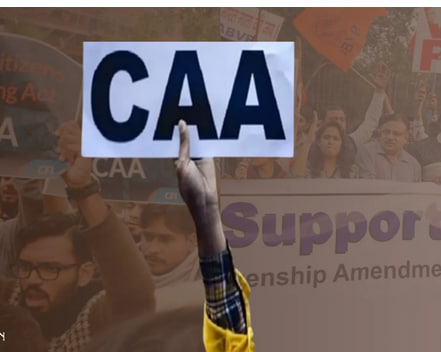Express View on CAA Rules: More harm than good
Hindu, Sikh, Buddhist, Jain or Parsi migrants from Pakistan, Afghanistan and Bangladesh who entered the country before December 31, 2014 now have clarity about the procedures and paperwork required to apply for Indian citizenship.
Four years after Parliament enacted the Citizenship (Amendment) Act 2019 (CAA), which excludes the Muslims, the Union Home Ministry has issued the Rules to give effect to the law. After the notification, Home Minister Amit Shah posted on X, “The PM has delivered on another commitment .” CAA was amongst the key items in BJP’s election manifesto of 2019 and the party is indeed right in claiming that the government has ticked another ideological box with the 39-page gazette notification.
And, who can have a quarrel with the country opening its doors to vulnerable people from the neighbourhood ? Immensely disquieting , however, is that the government has chosen to go ahead with the rules while the Act faces legal challenges. The CAA sparked protests in different parts of the country four years ago. The Rules do nothing to mitigate the Act’s discriminatory foundation that is at odds with the constitutional Right to Equality as well as the idea of a plural India, conceived at the time of Independence.
The government has maintained that Muslims have been excluded because Pakistan, Afghanistan, and Bangladesh are Islamic countries. However, more than 200 petitions have challenged CAA in the SC on the ground that it violates Article 14, which affirms that “the State shall not deny to any person equality before the law or the equal protection of the laws within the territory of India”. In the Court, the government will not just be tested on whether it cherry-picked the three neighbouring countries to keep Muslims out.
The question that it will also have to answer is this: If CAA was born out of concern for the vulnerable , why not extend it to the Rohingya from Myanmar, the Ahmadiyas from Pakistan or even Tamils from Sri Lanka? The government’s notifying the Rules before answering the legal challenge could do more harm than good to those it wants to rescue. It could expose a refugee who receives citizenship to another regime of uncertainty.
CAA has further alarmed all those who have stakes in peace and calm in the Northeast. The December 2014 cut-off has created unease in Assam, where migration, identity and citizenship have been fraught issues for more than four decades . A case on the cut-off date for migrants to the state is before the Supreme Court.
Moreover , the NRC process has created more faultlines than it has settled in Assam and the issue of who is a “foreigner” continues to fester . Now, the notification of the CAA Rules has, reportedly , ignited another round of protests in the state. In the run-up to an election campaign that portends to be divisive , the government has framed the Rules, paying little heed to questions asked of it. All eyes are now on the Supreme Court.
